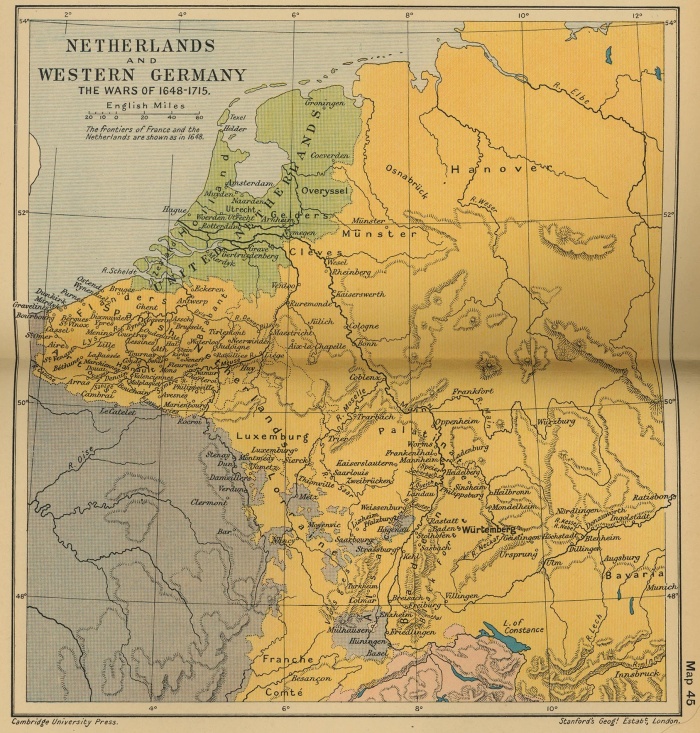Displaying image 69 of 467 images in History.
The Netherlands and Western Germany: The Wars of 1648-1715
1647–50
WILLIAM II succeeded his father, Frederick Henry, in the stadholdership. Able, ambitious, and restless, William disapproved of the Treaty of Münster (1648), which recognized the independence of the provinces, and would have preferred to continue the war. He soon became involved in conflict with the states-general and, by arresting some of the leaders of Holland and attacking Amsterdam itself (1650), forced the submission of the state-rights group. 1
1650, Nov. 6
William died. His son was born posthumously. 2
1651
The Estates held a constituent assembly but only agreed to stop the possibility of recreating the office of captain-general. 3
1652–54
The FIRST ANGLO-DUTCH WAR, the direct outgrowth of the English Navigation Act (1651) (See 1652–54). 4
1652
Dutch South Africa founded (See 1652). 5
1653
John De Witt became pensionary of Holland and thereby controlled the general policy. An able statesman and adroit diplomat, he easily maintained Dutch prestige and greatness. 6
1657–60
The Dutch prevented the entrance of the Baltic from falling into exclusively Swedish control by supporting the Danish in the Swedish-Danish War (See 1655–60). 7
1657–61
War with Portugal, over conflicting interests in Brazil.
1660
Dutch states-general rescinded the exclusion of the House of Orange from the stadholdership following the restoration in England.
1662
The Dutch allied themselves with the French to provide against the danger of attack by the British.
1664
The British seized New Amsterdam (New York) and appropriated various Dutch stations on the African coast.
1665–67
SECOND ANGLO-DUTCH WAR. France and Denmark supported the Dutch (See 1665–67).
1667
The Eternal Edict abolished the stadholdership. It would be reinstated and made hereditary after 1748.
1668, Jan. 23
Triple Alliance of England, Holland, and Sweden (See Jan. 23).
1669
Beginning of a number of government policies restricting emigration (continued reforms until 1750).
1672–78
WAR WITH FRANCE AND ENGLAND. The French were able to overrun much of the Netherlands (See 1672–78). John De Witt was murdered in a riot (Aug. 27, 1672).
1672–1702
WILLIAM III (son of William II), stadholder. The British abandoned the war (1674) and the Dutch came off without losses.
1688–97
WAR OF THE LEAGUE OF AUGSBURG against Louis XIV. William led the coalition (See 1688–97).
1702, March 8
The death of William III, without children, brought to an end the direct line of the house of Orange, which, however, was continued by the related house of Nassau.
1701–14
The WAR OF THE SPANISH SUCCESSION (See 1701–14).
1715, Nov. 15
The Barrier Treaty. Holland received key territories on the French frontier from the empire as protection against attack from France.
Source: The Encyclopedia of World History, 6th Ed, 2001



 Searching...
Searching...

 Previous
Previous
 Next
Next